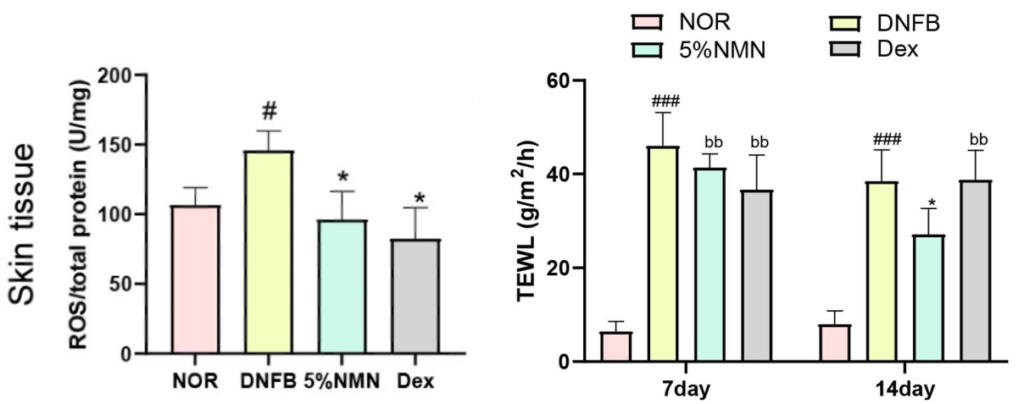Researchers Show Topical NMN Relieves Skin Inflammation
Wuhan University scientists show that NMN prevents severe skin damage and reduces harmful molecules called reactive oxygen species in mice.
Highlights:
- The topical application of NMN prevents lesions, itching, rash, and scaling in a mouse model for eczema (inflammatory skin disease).
- NMN also alleviates signs of skin aging, including excessive reactive oxygen species (ROS) and elevated water loss.
Our skin is an external barrier full of immune cells that guard our internal organs against pathogens. Like most immune cells, when skin immune cells malfunction, they promote inflammation. Such is the case with eczema (atopic dermatitis), a skin disease characterized by excessive inflammation. Due to age-related immune system decline and body-wide inflammation, we become more susceptible to eczema as we age. Now, researchers from Wuhan University in China may have found a potential treatment for eczema in nicotinamide mononucleotide (NMN).
As reported in International Immunopharmacology, NMN, a molecule capable of raising cellular nicotinamide adenine dinucleotide (NAD+) levels, may improve the inflammatory skin disease eczema. Gao and colleagues show that topical application of NMN prevents eczema-like symptoms, including skin lesions, itching, rash, and water loss in mice by blocking ROS. Since eczema and normal skin aging share common symptoms, these findings suggest that topical NMN can treat eczema and age-related skin inflammation.
NMN Prevents Inflammation-Induced Skin Damage
Gao and colleagues chemically induced skin inflammation in mice to establish an eczema mouse model. Untreated eczema model mice displayed severe skin lesions, itching, rash, and scales. Treating these mice by topical application of NMN markedly reduced these symptoms.

Normal skin aging and eczema share several cellular processes and skin symptoms, including excessive ROS and water loss. ROS are a class of highly reactive oxygen molecules that can directly damage cells if not neutralized by antioxidants. ROS can damage the cells that form the skin’s protective barrier, fostering inflammation.
The Wuhan researchers showed that NMN reduces ROS and inflammatory molecules while increasing natural (endogenous) antioxidant levels in eczema model mice. NMN treatment also increases proteins involved in skin barrier function. Furthermore, NMN treatment reduces skin water loss, a common symptom of aging skin that contributes to dryness. These findings suggest that NMN can not only reverse aspects of eczema but also normal skin aging.

NAD+ is an essential molecule that mediates the production of energy and fuels enzymes with critical cellular functions like DNA repair. Cells utilize NMN to synthesize NAD+, thus increasing its concentration levels. Gao and colleagues showed that NMN could reduce ROS, suggesting that NAD+ can alleviate oxidative stress — the damage caused to cells by excessive ROS.
Can NMN Reverse Skin Aging?
Skin aging, associated with excessive ROS and oxidative stress, is accelerated by environmental factors like ultraviolet (UV) radiation and air pollution. Therefore, treatments that limit oxidative stress can hypothetically slow down or prevent skin aging. Animal studies suggest NMN could slow accelerated skin aging by protecting against UV radiation and intestinal bacteria dysfunction. NMN also protects skin cells from particulate matter, microscopic particles often contained within polluted air. Notably, these and other studies show that NMN acts by limiting ROS and oxidative stress, suggesting that NMN is targeting one of the underlying causes of skin aging. However, there is a lack of human studies showing that NMN affects skin aging.
Model: female Kunming mice
Dosage: 5% NMN dissolved in acetone and oil applied topically to the skin

